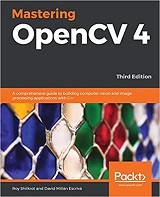
|
FreeComputerBooks.com
Links to Free Computer, Mathematics, Technical Books all over the World
|
|
- Title: Mastering OpenCV 4: A Comprehensive Guide to Building Computer Vision and Image Processing Applications with C++, 3rd Edition
- Author(s) Roy Shilkrot (Author), David Millan Escriva (Author)
- Publisher: Packt Publishing (December 27, 2018); eBook (Free Edition)
- Permission: Free eBook by the Publisher (Packt)
- Paperback: 280 pages
- eBook: HTML
- Language: English
- ISBN-10: 1789533570
- ISBN-13: 978-1789533576
- Share This:

|
This book targets computer vision engineers taking their first steps toward mastering OpenCV. Keeping the mathematical formulations to a solid but bare minimum, the book delivers complete projects from ideation to running code, targeting current hot topics in computer vision such as face recognition, landmark detection and pose estimation, and number recognition with deep convolutional networks.
- Learn about the new features that help unlock the full potential of OpenCV 4
- Build face detection applications with a cascade classifier using face landmarks
- Create an optical character recognition (OCR) model using deep learning and convolutional neural networks
This book is for those who have a basic knowledge of OpenCV and are competent C++ programmers. You need to have an understanding of some of the more theoretical/mathematical concepts, as we move quite quickly throughout the book.
About the Authors- Roy Shilkrot is an assistant professor of computer science at Stony Brook University, where he leads the Human Interaction group.
- David Millan Escriva was eight years old when he wrote his first program on an 8086 PC in Basic, which enabled the 2D plotting of basic equations.
- Computer and Machine Vision
- C++ Programming
- Digital Signal Processing (DSP), Sound and Imaging Processing

- Mastering OpenCV 4: A Comprehensive Guide to Building Computer Vision and Image Processing Applications with C++, 3rd Edition (Roy Shilkrot, et al)
- The Mirror Site (1) - PDF
-
 Handbook of Digital Face Manipulation and Detection
Handbook of Digital Face Manipulation and Detection
This open access book provides the first comprehensive collection of studies dealing with the hot topic of digital face manipulation such as DeepFakes, Face Morphing, or Reenactment. It combines the both biometrics and media forensics fields.
-
 Computer Vision: Algorithms and Applications, Second Edition
Computer Vision: Algorithms and Applications, Second Edition
This book explores the variety of techniques used to analyze and interpret images. It also describes challenging real-world applications where vision is being successfully used, both in specialized applications as well as for fun, consumer-level tasks.
-
 Computer Vision: Models, Learning, and Inference (Simon Prince)
Computer Vision: Models, Learning, and Inference (Simon Prince)
The book starts from the basics of probability and model fitting and works up to real examples that the reader can implement and modify to build useful vision systems. The detailed methodological presentation is useful for practitioners of computer vision.
-
 Programming Computer Vision with Python: Tools and Algorithms
Programming Computer Vision with Python: Tools and Algorithms
This book is a hands-on introduction to computer vision using Python. It gives an easily accessible entry point to hands-on computer vision with enough understanding of the underlying theory and algorithms to be a foundation for students, researchers.
-
 Developing Graphics Frameworks with Python and OpenGL
Developing Graphics Frameworks with Python and OpenGL
It shows you how to create software for rendering complete three-dimensional scenes, explains the foundational theoretical concepts as well as the practical programming techniques that will enable you to create your own animated and interactive worlds.
-
 Modern Robotics with OpenCV (Widodo Budiharto)
Modern Robotics with OpenCV (Widodo Budiharto)
This book is written to provide an introduction to intelligent robotics using OpenCV. It gives you a firm grounding in computer vision and OpenCV for building simple or sophisticated Robotics applications.
-
 Multimedia Forensics (Husrev Taha Sencar, et al)
Multimedia Forensics (Husrev Taha Sencar, et al)
Media forensics has never been more relevant to societal life. This book presents a comprehensive review of state-of-the-art forensics capabilities that relate to media attribution, integrity and authenticity verification, and counter forensics.
-
 Computer Vision: Algorithms and Applications (Richard Szeliski)
Computer Vision: Algorithms and Applications (Richard Szeliski)
This book explores the variety of techniques commonly used to analyze and interpret images. It also describes challenging real-world applications such as medical imaging and fun consumer-level tasks such as image editing and stitching, etc.
-
 Computer Vision Metrics: Survey, Taxonomy, and Analysis
Computer Vision Metrics: Survey, Taxonomy, and Analysis
This book provides an extensive survey and analysis of over 100 current and historical feature description and machine vision methods, with a detailed taxonomy for local, regional and global features.
-
 Numerical Algorithms: Computer Vision, Machine Learning, etc.
Numerical Algorithms: Computer Vision, Machine Learning, etc.
This book presents a new approach to numerical analysis for modern computer scientists, covers a wide range of topics - from numerical linear algebra to optimization and differential equations - focusing on real-world motivation and unifying themes.
-
 Computer Vision (Xiong Zhihui)
Computer Vision (Xiong Zhihui)
This book presents research trends on computer vision, especially on application of robotics, and on advanced approachs for computer vision (such as omnidirectional vision). Among them, research on RFID technology integrating stereo vision to localize an indoor mobile robot is included in this book.
-
 Computer Vision (Dana H. Ballard, et al)
Computer Vision (Dana H. Ballard, et al)
This book is the construction of explicit, meaningful descriptions of physical objects from images. Image understanding is very different from image processing, which studies image-to-image transformations, not explicit description building.
-
 Brain, Vision and AI (Cesare Rossi)
Brain, Vision and AI (Cesare Rossi)
The aim of this book is to provide new ideas, original results and practical experiences regarding service robotics. This book provides only a small example of this research activity, but it covers a great deal of what has been done in the field recently.





